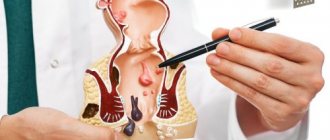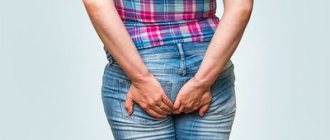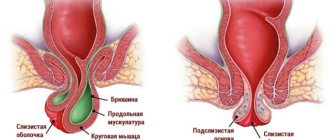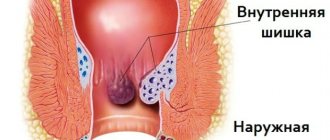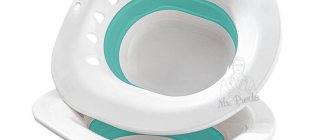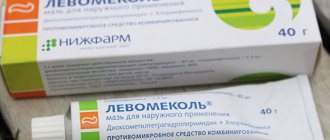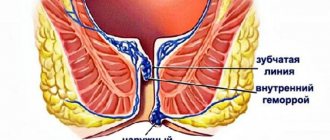Pregnancy, childbirth, and breastfeeding are important stages in a woman’s life. Unfortunately, during this period, negative aspects related to health may worsen.
Statistics on the occurrence of hemorrhoids in pregnant women indicate that primiparous women are susceptible to this problem in 20 cases out of a hundred; in multiparous women, the risk of hemorrhoids increases to 40-50%.
Treatment of hemorrhoids in women during pregnancy is a task feasible for modern proctology.
Content
- Causes of inflammation of hemorrhoids in pregnant women
- What to do for hemorrhoids during pregnancy?
- Action plan when planning pregnancy
- A case from the practice of a proctologist
- Removal of hemorrhoids with laser
Hemorrhoids often develop during pregnancy and childbirth. In some cases, it also becomes inflamed. Sometimes the inflammation is very significant and is accompanied by severe pain. The duration of exacerbation of hemorrhoidal disease during pregnancy is from 1-2 weeks to several months. It happens that hemorrhoids begin at 5-6 months and bother you until the end of pregnancy.
If hemorrhoids become inflamed during pregnancy, then after childbirth there is almost always an exacerbation of hemorrhoidal disease.
How long can hemorrhoids bother you after childbirth? Very different: from 1 week to several months, until the woman consults a proctologist. Most often, surgery is not possible in this case.
What are hemorrhoids - types, symptoms, features in pregnant women
Hemorrhoids are a disease in which the vessels in the anus dilate and form hemorrhoids - inside the anus or outside under the skin.
Internal hemorrhoids form inside the anal canal. Internal hemorrhoids are often painless, but they can prolapse and bleed. External hemorrhoids form near the anus. If a blood clot develops in one of the external hemorrhoids, severe pain may occur. External hemorrhoids feel like a painful, hard hemorrhoidal lump. Hemorrhoids develop under the influence of certain factors. Pregnancy, along with other risk factors, contributes to the development of hemorrhoids. The incidence of the disease in pregnant women increases in the second and third trimesters of pregnancy, as well as immediately after childbirth.
A growing uterus with a fetus and a sedentary lifestyle lead to impaired blood flow from the pelvis; chronic constipation in pregnant women contributes to excessive straining during bowel movements, which in turn contributes to the prolapse of nodes from the anus.
Symptoms of hemorrhoids can vary: bleeding after bowel movements, pain, prolapse of nodes, sensation of a foreign body in the rectum. In addition, hemorrhoids can be characterized by a chronic course (chronic hemorrhoids): with minor, mildly expressed symptoms; and acute, in which there is a sharp pain in the anus and a rapidly swelling painful node or several nodes appear, which thrombose under the influence of certain factors. Thrombosis of the hemorrhoid is an indication for surgical treatment (if the disease is no more than 3 days old). This is also an indication for the treatment of exacerbation of chronic hemorrhoids. Other symptoms of acute hemorrhoids can be treated by adjusting the treatment regimen and prescribing medications.
What to do for hemorrhoids during pregnancy?
Extensive experience in proctology (about 20 years) and the use of lasers (5 years) allowed us to develop treatment tactics that allow us to preserve and improve the health of our patients.
Necessarily! Just as you have the courage to go to a gynecologist before planning a pregnancy, also go to a proctologist.
We must clearly remember that during pregnancy, no matter how much hemorrhoids bother you, they can only be treated conservatively: ointments, suppositories, laxatives. Recently, people have been trying not to prescribe venotonic tablets. There is evidence that these drugs have an adverse effect on the fetus.
Health care plan for expectant mothers regarding hemorrhoidal disease
- You are 18-25 years old , planning your FIRST pregnancy , your butt has never bothered you (there were no inflammations or painful nodes in the anus, no pain during bowel movements, no blood in your stool) - most often you don’t need to go to a proctologist. If you are worried about not knowing, come, we will conduct an examination and find out if there are hidden, asymptomatic problems.
- You are 18-25 years old , planning a SECOND pregnancy , your butt has never bothered you, including during your first pregnancy and after childbirth - go to a proctologist. 50-70% of patients have hemorrhoids, often small. During the second pregnancy, the probability of inflammation of the nodes is more than 50%, after childbirth - even more!
- You are 18-25 , planning your FIRST pregnancy , you have already had problems before: inflamed nodes, pain during bowel movements, bleeding - you MUST go to a proctologist.
During pregnancy, the probability of inflammation of the nodes is more than 50%. After childbirth, almost everyone experiences a severe exacerbation. - Girls over 25 years old when planning their FIRST pregnancy , even if the butt has never bothered you, go to a proctologist. Why? Nowadays a huge number of young people study or work SITTING. Your fitness 3 times a week for 1-2 hours does not compensate for 8-10 hours of daily sitting. Previously, hemorrhoids were a driver's disease, but now they have become a disease of office workers, students and even schoolchildren. This happens, no need to be surprised.
My head can’t contain all the stories that I heard, when everything was fine (well, or a little not good, but not much), and at 6-7 months of pregnancy it became bad - the nodes became inflamed and “I didn’t know, I don’t care.” They said that we need to go to the proctologist!” NOW YOU KNOW!
After the FIRST and even more so after the SECOND birth, there will almost always be dilatation of the veins of the external hemorrhoidal plexuses. They may not become inflamed yet, but this, alas, is temporary. During pregnancy, inflammation is very likely.
The need for treatment of hemorrhoids in an expectant mother
External and internal hemorrhoids
All the above reasons are favorable factors for the development of hemorrhoids in the body. Therefore, their occurrence is not subject to the activities of a pregnant woman. No matter how much she wants to have them, they will still appear and manifest themselves in her condition. But enduring constant pain when going to the toilet is also not an option. It is imperative to treat them. Treatment of hemorrhoids is complicated by the fact that many of the components included in the medications will necessarily enter the circulatory system, circulating not only in the mother’s body, but also in the baby’s body.
Due to this, they can have a negative impact on the child’s body. Taking medications orally, as a result, is not the most successful way to get rid of the problem. Other treatment methods should be considered. The best method of treatment in this situation is the use of special medicinal ointments, which have minimal harm to the health of the unborn baby. The pharmacy chain is simply replete with a variety of ointments for hemorrhoids, which are prescribed to pregnant women.
It is best to get rid of hemorrhoids before childbirth, so that the hemorrhoidal node does not become pinched during pushing. And as you know, if such pinching occurs, the woman will experience additional pain during childbirth, which is extremely undesirable. The use of conservative treatment has the most favorable positive effect on the body of the unborn baby. Before using any ointments, you should definitely consult with your doctor, and sometimes undergo appropriate tests.
In addition to the well-known ointments for hemorrhoids, there are special suppositories, the use of which will also not harm the baby developing in her body.
A case from the practice of a proctologist
Now let's consider this situation. I wrote about her in my telegram channel “Doctor-heals”.
During the first pregnancy and after childbirth there were thromboses of nodes, veins, and blood. Well, everything is as it should be during an exacerbation of hemorrhoidal disease. Then everything went away. There are small folds left near the anus, which do not hurt, but only spoil the beauty. I’ll tell you a secret - THIS IS HEMORRHOIDS!, my dears.
And now you are planning your second pregnancy. Here we have the development of two very common options for further events:
- The first option is not at all smart: I closed my eyes and “drove through the intersection for luck, according to the principle “maybe I’ll get through”... This doesn’t happen often. The logic of the reasoning is simple: “Since hemorrhoids don’t bother you now, they won’t bother you during your SECOND pregnancy either.” Yeah! Blessed are the ignorant... Why, if hemorrhoids were inflamed during the FIRST pregnancy, then during the SECOND pregnancy they will not become inflamed. Maybe 1-2 out of 100 won’t, but that’s with my mother’s prayers... For the rest, it will be whatever it is. Don't say you didn't know. We didn’t think so – yes, I believe it. Now you know, I thought for you and told you.
- The second option is smarter, but the life principle: “trust, but verify” has not been canceled. As a conscientious patient, I went to the proctologist, and he said that there is no need to do anything now, anyway, after childbirth it will be larger, then we will operate. Re-read the first version of the story, well, you will get pregnant and what will happen next. Have you reread it? Now you know. In general, with this topic, “as for childbirth... it’s not necessary, anyway...” Dear, my dear readers, think about this phrase! She is very ambiguous! Let's look at similar situations. There is no need to treat your teeth either; they will fall out on their own (or they will pull them out if they hurt too much). There is no need to remove a polyp or mole either; when there is cancer, then we will operate. There is also no need to operate on appendicitis, but if there is already peritonitis... There is no need to undergo treatment in general either, everyone dies in the end anyway.
Of course, if we consider the issue of hemorrhoids in a woman who wants to get pregnant from the perspective of a proctologist 20-30 years ago, then yes, one operation is better than two. “And when there are larger hemorrhoids, we will cut them off, sew everything up, and if you don’t get pregnant, there is a high chance that you will no longer have hemorrhoids.”
But times are changing!
Now a proctologist can use a laser to remove 1-2 veins the size of a buckwheat grain, if necessary, not to mention the internal nodes, and live in peace. Have children, raise them to your joy.
You treat your teeth before pregnancy, knowing that during pregnancy they are more destroyed. Otherwise you will be left with stumps in your mouth. And after childbirth, they have to be treated repeatedly throughout their lives. And teeth are basically a bone structure, it is more stable than veins - soft tissue.
Removal of hemorrhoids with laser
After this small operation, which is performed on an outpatient basis and without pain, during pregnancy there is a more than 90% chance that hemorrhoids will not bother you. In 5-10% of pregnant women, slight swelling appears in the anus (there is still living tissue there, and swelling also occurs on the legs). Sometimes small veins, up to several millimeters, may appear and become inflamed. This is not at all comparable to inflammation of an entire hemorrhoid. But this is my reinsurance.
For almost 5 years of practice, not a single patient I operated on came during pregnancy with large inflamed nodes, wrote to me in the messenger or called me.
Yes, 5-10% may have small nodes after childbirth. We will remove it with a laser again and live in peace.
A phrase I have repeatedly heard from patients: “It’s good to be without hemorrhoids!” speaks for itself.
How is the operation performed?
We remove hemorrhoids with a laser through small punctures of the skin near the node. The operation is painless and is performed under local anesthesia. After it, sometimes half of the patients experience discomfort for up to 30 minutes. You go home 1 hour after the operation and go about your business, but without much stress.
If someone is in fitness, then in 2-3 weeks, please train.
A small but important point - all this applies to small or medium-sized hemorrhoids.
If the hemorrhoids are large enough or old (several years), or in those who have had surgery before, the recovery is a little more uncomfortable in the first week or two after surgery. A little - actually a little. Don’t be afraid, you took the Nise tablet if necessary and nothing bothers you.
With long-term hemorrhoids, the skin around the anus may stretch and anal fimbria may form. At the request of the patient, we will make the butt beautiful - we will remove these fringes.


